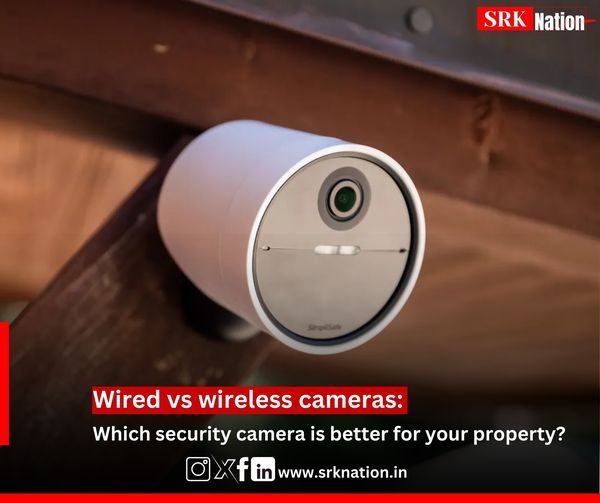Thinking about getting a security camera for your home or business? It’s a great way to keep an eye on things and feel safer. But there are two main types to choose from: wired vs wireless security cameras. If you are yet to decide which one is right for you, here’s our comprehensive guide.
Wired cameras are like traditional cameras that need to be plugged into the wall. They usually have better picture quality and can record for longer.
Wireless cameras, as the term suggests, don’t need wires. They connect to your Wi-Fi network, so they’re easier to put anywhere you want.
So, which type of camera is better for home and business security? Let’s have a closer look at the pros and cons, installation differences, costs, and accessibility of each type of camera.
Which type of camera is right for home security?
Security cameras for small homes
If you live in a small home, wireless cameras might be a great choice. They’re easy to set up, just plug them in and connect to your Wi-Fi. This means you can put them anywhere you want, even if there aren’t any wires nearby. Plus, they’re usually a bit cheaper to buy.
Security cameras for larger homes
For bigger homes, wired cameras might be a better option. They’re more reliable because they don’t rely on Wi-Fi. This means you’re less likely to have problems with them. They can also record for longer periods, which is important if you want to keep a close eye on your home.
Security cameras for rental properties
If you’re a landlord, wired cameras can be a good investment. They’re more reliable and can provide better evidence if there are any problems. However, they can be more expensive to install.
As a tenant, you might prefer wireless cameras because they’re easier to set up and remove. But make sure to check with your landlord first to see if they have any rules about installing cameras.
Which type of camera is right for business security?
Security cameras for small businesses
Wireless cameras are a better option for small businesses. They’re easy to install and can be placed almost anywhere. With wireless security cameras, you can monitor your business from home or on the go anytime from anywhere.
Small businesses include:
• Retail stores: Convenience stores, boutiques, small grocery stores, etc
• Service stores: Salons, small restaurants, etc
• Home-based businesses: Online stores, freelance services, tutoring, etc
• Professional services: Law firms, accounting firms, small marketing agencies, etc
Security cameras for larger businesses
If you own a large business you must consider installing wired security cameras as they offer better reliability and can be used to monitor multiple areas of your business at once. They’re also a good option if you need to record footage for an extended period.
Large businesses include:
• Retail: Department stores, supermarkets, shopping malls, etc
• Manufacturing: Factories, assembly plants, etc
• Hospitality: Hotels, resorts, large restaurants, etc
• Financial services: Banks, insurance companies, etc
• Technology: Software companies, hardware manufacturers, etc
Privacy concerns: Wired vs wireless security cameras
Wireless security cameras are often considered more discreet because they don’t require visible wires running through your home. This can be particularly important in areas where privacy is a major concern, especially indoors.
Wired security cameras might be more noticeable due to the visible cables. However, there are ways to route these cables discreetly:
• Concealed wiring: Cables can be routed behind baseboards, along walls or through ceiling voids to minimise visibility.
• Wireless bridges: In some cases, it’s possible to use wireless bridges to extend the range of a wired camera system, reducing the need for extensive cabling.
• Custom installations: Professional installers typically come up with creative solutions to hide cables and maintain a discreet appearance.
Budget considerations: Wired vs wireless security cameras
Upfront costs
• Wired security cameras typically have higher upfront costs due to the installation of cables, power outlets and other infrastructure. This can be especially expensive for larger homes or businesses.
• Wireless security cameras generally have lower upfront costs as they don’t require extensive wiring. This makes them more accessible to those on a tight budget.
Maintenance
• Wired security cameras often have lower ongoing costs as they don’t require frequent battery replacements or software updates. They are typically powered by AC outlets, which are readily available in most homes and businesses.
• Wireless security cameras have higher ongoing costs, especially if they are battery-powered. Battery replacement can be frequent, depending on usage and battery quality. Additionally, wireless cameras may require regular software updates to maintain optimal performance and security.
Installation complexity: Wired vs wireless security cameras
Wireless cameras
• Ease of installation: Wireless cameras are mostly easier to install as they don’t require physical wiring. This makes them a good option for homeowners or business owners who are not comfortable with DIY electrical work.
• Wi-Fi signal requirements: Wireless cameras rely on a strong Wi-Fi signal for reliable operation. If your home or business has weak Wi-Fi coverage, you may need to install additional Wi-Fi access points.
Wired cameras
• Installation complexity: Wired cameras can be more complex to install, as they involve running cables through walls, ceilings, or floors. This may require professional installation services, especially for larger homes or businesses.
• Flexibility: Wired cameras offer greater flexibility in terms of placement, as they can be installed almost anywhere there is a power outlet. This can be beneficial for monitoring areas that are difficult to reach with wireless cameras.
Which type of camera is more prone to being hacked: Wired or wireless security camera?
Wireless security cameras are generally more prone to hacking than wired cameras. This is because they rely on wireless networks, which can be vulnerable to attacks. Additionally, remote access features and firmware vulnerabilities can increase the risk of hacking for wireless cameras. To protect your cameras, use strong passwords, keep firmware updated and secure your network.
Can you install wireless security cameras outdoors?
Yes, many wireless cameras are designed for outdoor use. They often have weatherproofing features such as water resistance and dust protection. However, it’s important to check the specific specifications of the camera you’re considering to ensure it’s suitable for outdoor conditions. Some wireless cameras may require additional weatherproofing measures or may have limitations in extremely harsh environments.
Check out more security cameras for your property
To summarise, if you’re looking for something easy to set up and don’t mind paying a bit more later, wireless cameras might be a good fit. But if you want a more reliable system that’s cheaper in the long run, wired cameras could be the way to go. Just remember to check your local laws and consider your budget and the layout of your home or business.

See insights
Boost a post
Like
Comment
Send
Share






